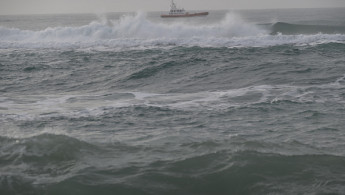14 migrants drown off Tunisia after wave of racist violence following President speech
Fourteen people from sub-Saharan Africa drowned in the Mediterranean, authorities said Thursday in Tunisia, where black migrants have faced a wave of violence since an inflammatory speech by President Kais Saied.
The drama occurred off the coast of Tunisia's Sfax region, where a spokesman for the court in charge of the investigation said the dead were from two sunken migrant boats.
Three migrants died and 34 were rescued in one sinking on Tuesday, followed Wednesday by 11 deaths in a separate incident with 20 rescued, the spokesman Faouzi Masmoudi said.
The coastguard, in an earlier statement on Facebook, said its personnel had rescued 54 people "of various sub-Saharan African nationalities", and recovered 14 bodies, but mentioned only one boat.
The agency said it had prevented a total of 14 attempts to cross the sea and rescued 435 migrants overnight Wednesday-Thursday, almost all from African countries south of the Sahara.
Many black migrants in Tunisia have been made homeless amid a wave of racist violence since President Kais Saied accused them last month of causing a crime wave and representing a "criminal plot" to change the country's demographic composition.
The North African country hosts around 21,000 undocumented migrants from other parts of Africa, less than 0.2 percent of the population.
Hundreds, including children and pregnant women, were made homeless in the winter cold and many registered with their embassies for repatriation, mostly to West African countries.
Others have sought to reach Europe in unseaworthy boats from Tunisia, whose coast lies about 130 kilometres (80 miles) from the Italian island of Lampedusa at its closest point.
The country has long been a springboard for people fleeing war and poverty elsewhere on the continent to seek better lives in Europe, along with thousands of Tunisians themselves.
Rome said in February that more than 32,000 migrants, including 18,000 Tunisians, reached Italy from Tunisia last year, while thousands more have departed from neighbouring Libya.
European governments, particularly in Rome, have pressured Tunis to stem the flow, and the coastguard regularly intercepts boats carrying migrants in its territorial waters, part of the world's deadliest migration route.
A spokesman told AFP on Thursday that the coastguard would continued to battle "gangs involved in organising clandestine immigration operations".
His comments sparked outcry, with rights groups accusing him of racism and hate speech. Landlords, fearing heavy fines and jail sentences, evicted hundreds of migrants, many of whom are still living rough in Tunis.
But Saied on Wednesday denied he was racist, saying he had African friends. He slammed the "malicious remarks" of those who "wanted to interpret the speech as they saw fit to harm Tunisia".
Speaking after a meeting with Guinea-Bissau's President Umaro Sissoco Embalo, who is chairman of the Economic Community of West African States (ECOWAS), Saied said migrants in Tunisia were "brothers".
He said the aim of his speech was to ensure respect for "Tunisian legality regarding foreigners".
"This situation concerning Africans cannot be interpreted by malicious tongues, as they have done in recent days, as racism. What are they talking about?"
"I am African and I am proud to be African," he said.
Embalo, current chairman of the Economic Community of West African States (ECOWAS), said Saied's speech on sub-Saharan migrants had been "misinterpreted".
The African Union has previously expressed "deep shock and concern" at Saied's remarks, urging member states to "refrain from racialised hate speech that could bring people to harm".





 Follow the Middle East's top stories in English at The New Arab on Google News
Follow the Middle East's top stories in English at The New Arab on Google News


